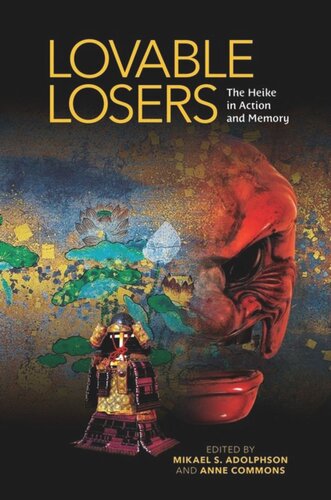

Most ebook files are in PDF format, so you can easily read them using various software such as Foxit Reader or directly on the Google Chrome browser.
Some ebook files are released by publishers in other formats such as .awz, .mobi, .epub, .fb2, etc. You may need to install specific software to read these formats on mobile/PC, such as Calibre.
Please read the tutorial at this link: https://ebookbell.com/faq
We offer FREE conversion to the popular formats you request; however, this may take some time. Therefore, right after payment, please email us, and we will try to provide the service as quickly as possible.
For some exceptional file formats or broken links (if any), please refrain from opening any disputes. Instead, email us first, and we will try to assist within a maximum of 6 hours.
EbookBell Team

4.8
44 reviewsLovable Losers is the first substantial piece of English-language scholarship to examine the actions and the memorization of the Heike (Ise Taira), a family of aristocratic warriors whose resounding defeat at the hands of the Seiwa Genji in 1185 resulted in their iconic status as tragic losers. The Tale of the Heike and the many other works derived from it set in place the depiction of the Heike as failed upstart aristocrats whose spectacular downfall was due to neglect of their warrior heritage and the villainy of the family head, Taira no Kiyomori. Lovable Losers aims to contextualize and deconstruct representations of the Heike not only to show how such representations were created in specific contexts in response to specific needs, but also to demonstrate that the representations themselves came to create and sustain a particular kind of culture.
Drawing on the expertise of scholars in a variety of disciplines, this volume explores the Heike in their own time and their depiction as cultural figures in the centuries that followed. Their portrayal in literature and the arts spans more than eight hundred years and a wide range of genres and media, including nō plays, picture scrolls, early modern comic books, novels, and film. In texts from the sixteenth to twentieth centuries, the Heike serve as catalysts for miracles and vectors for subtle criticisms of the Tokugawa government. Over time Kiyomori became an emblem of postwar democracy and economic progress; today he is a powerful symbol of modern citizens' dissatisfaction with politics.
The Heike’s ambiguous moral standing allowed them to be reimagined, reconstructed, and repurposed by different authors in different contexts, as both heroes and villains. Rather than assuming their failure, Lovable Losers repositions the Heike within the larger phenomenon of the Genpei War and its aftermath, demonstrating how they took advantage of their station as nobles and warriors. The new research it presents seeks to transcend categorization and blur the lines between different approaches to the Heike to give a well-rounded depiction of a family who has played a defining role in Japanese culture in action, in memory, and somewhere in between.